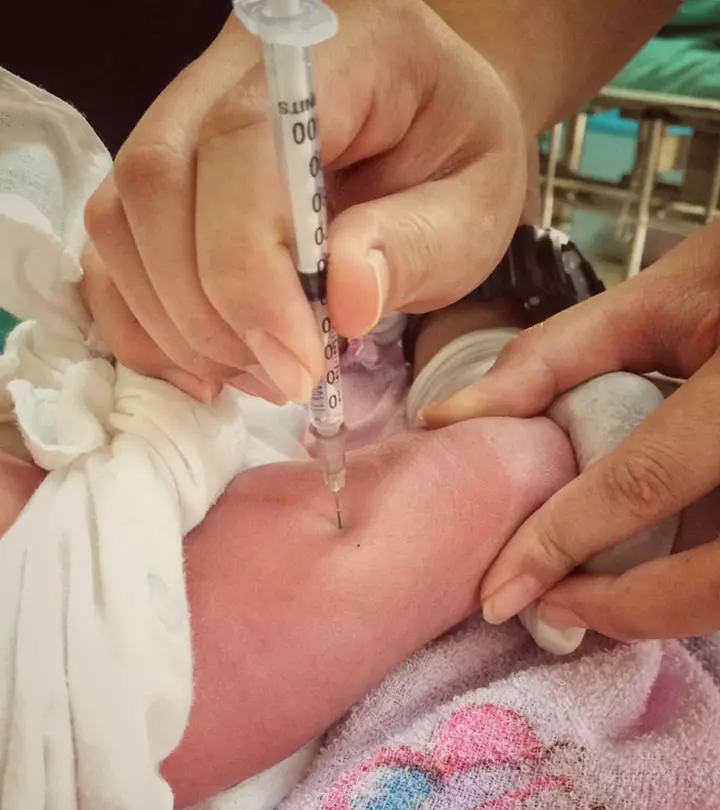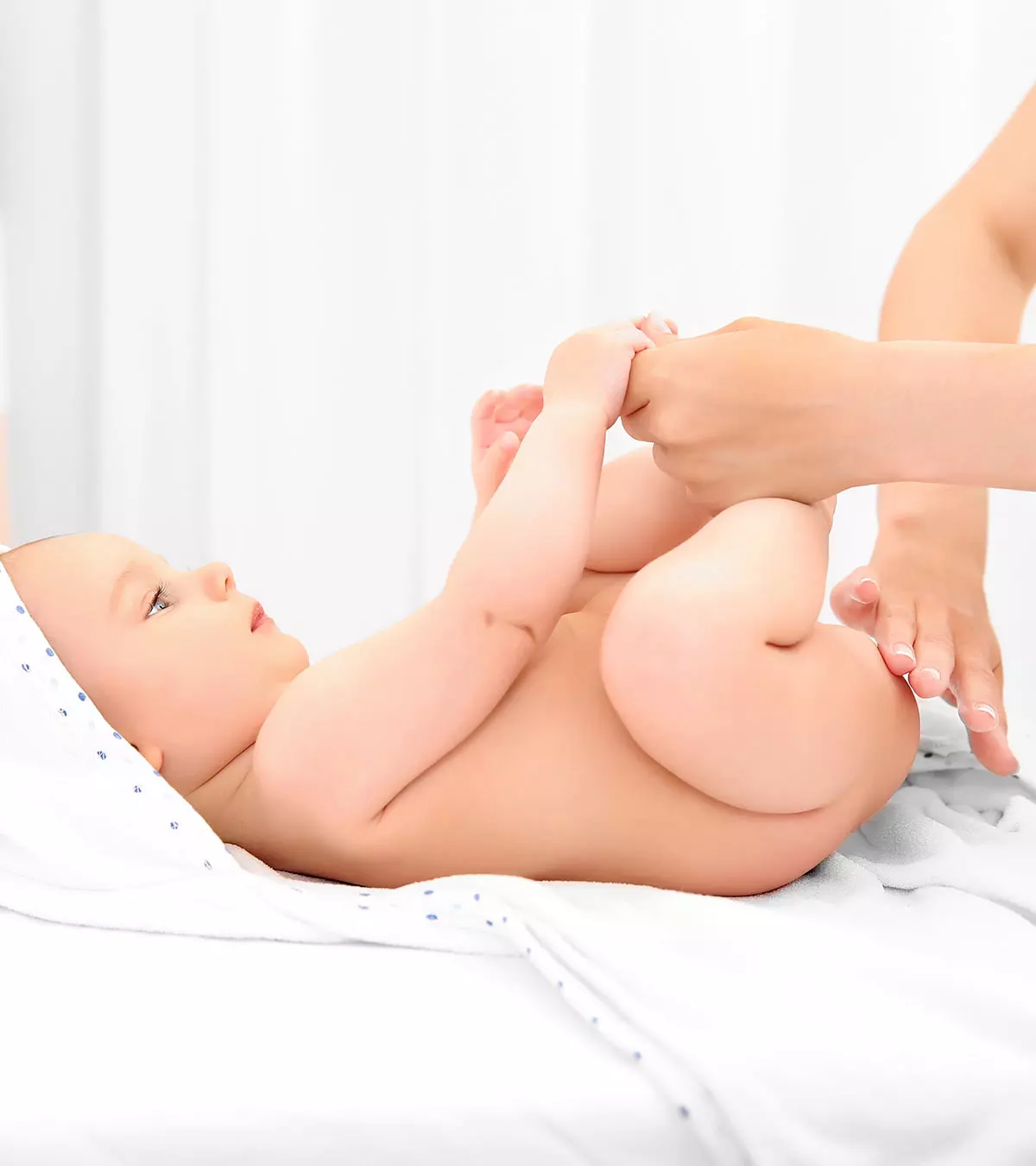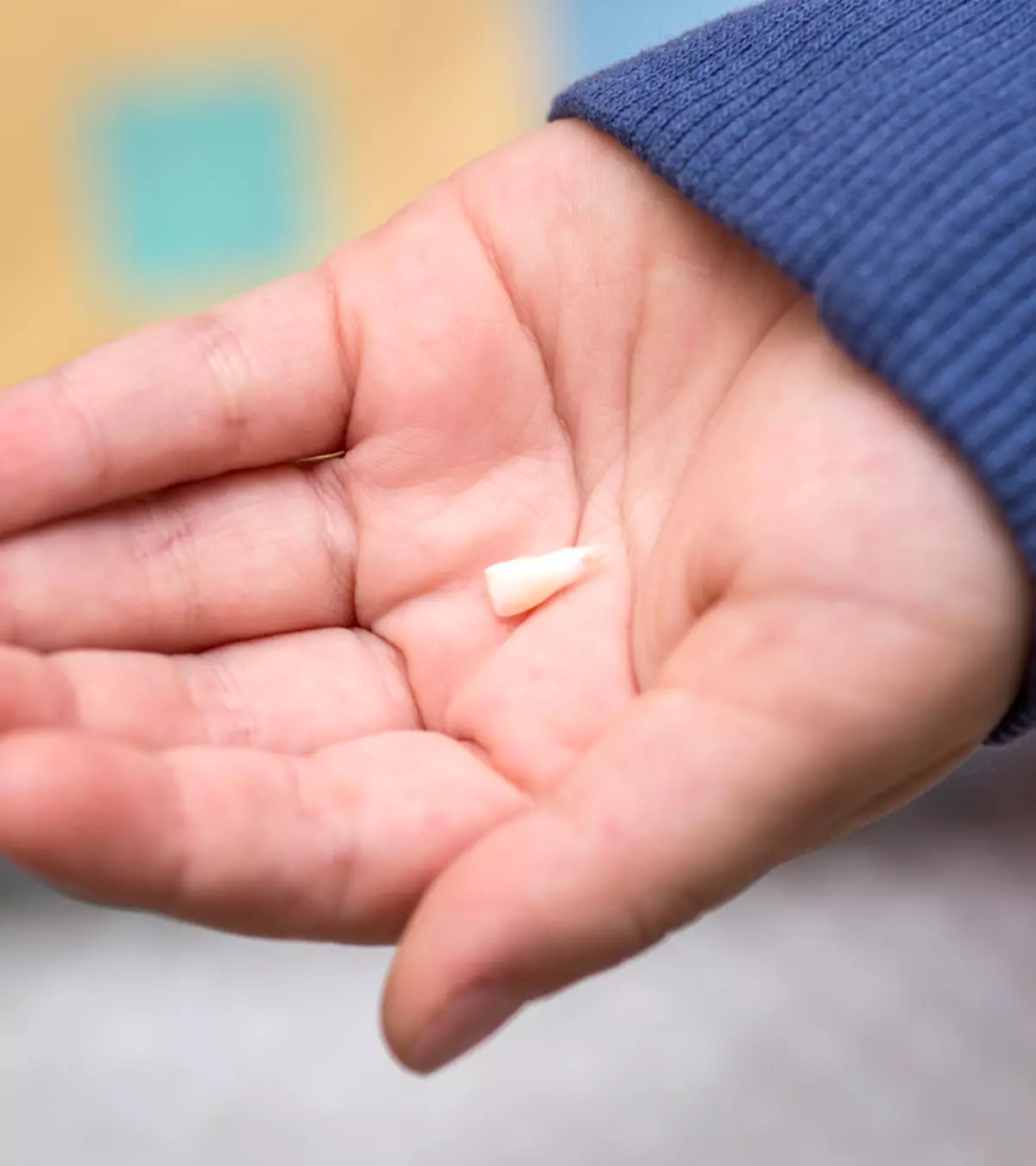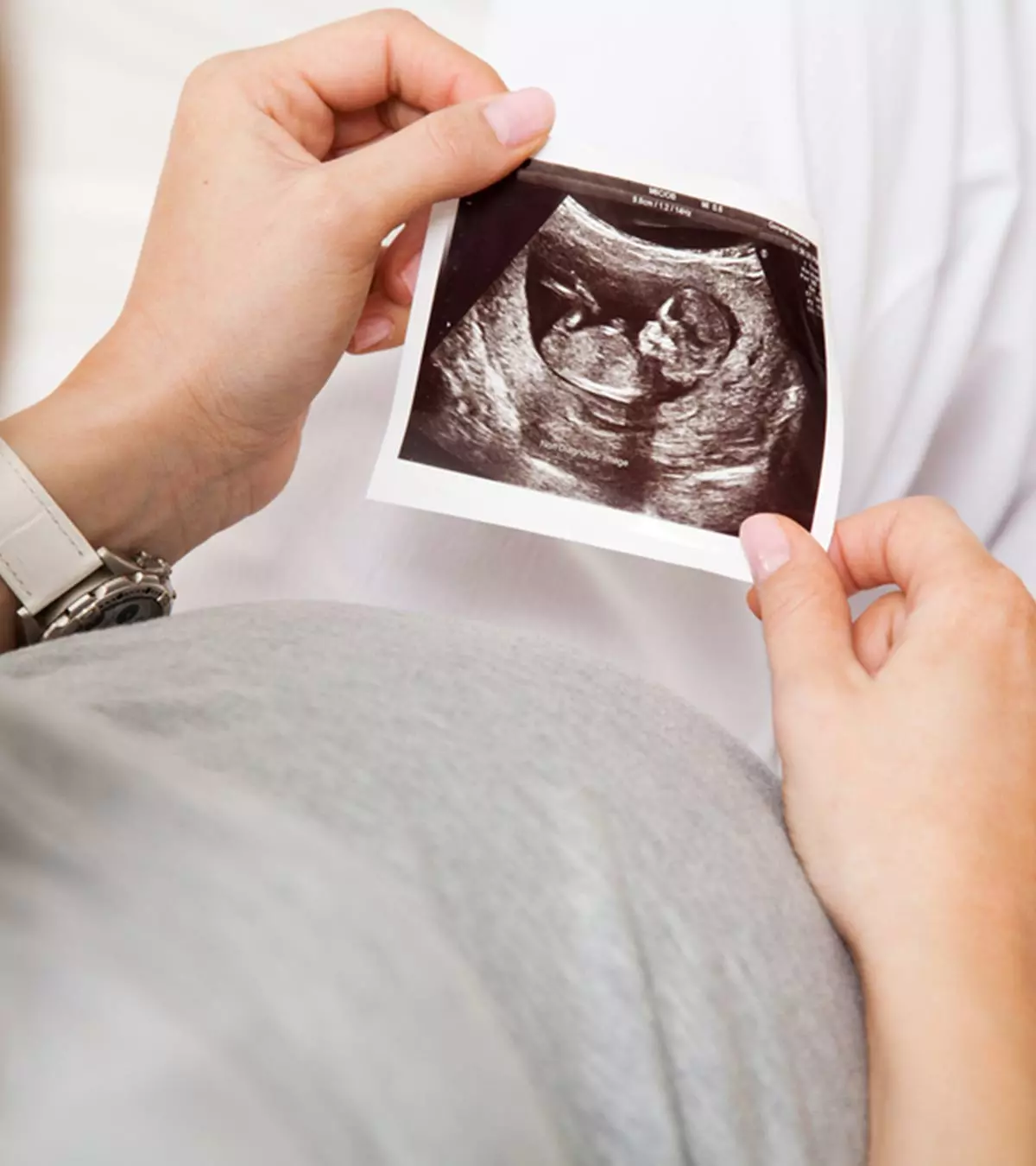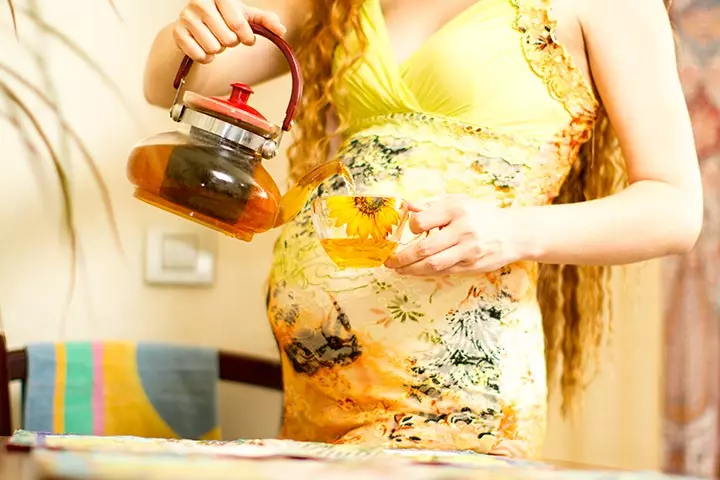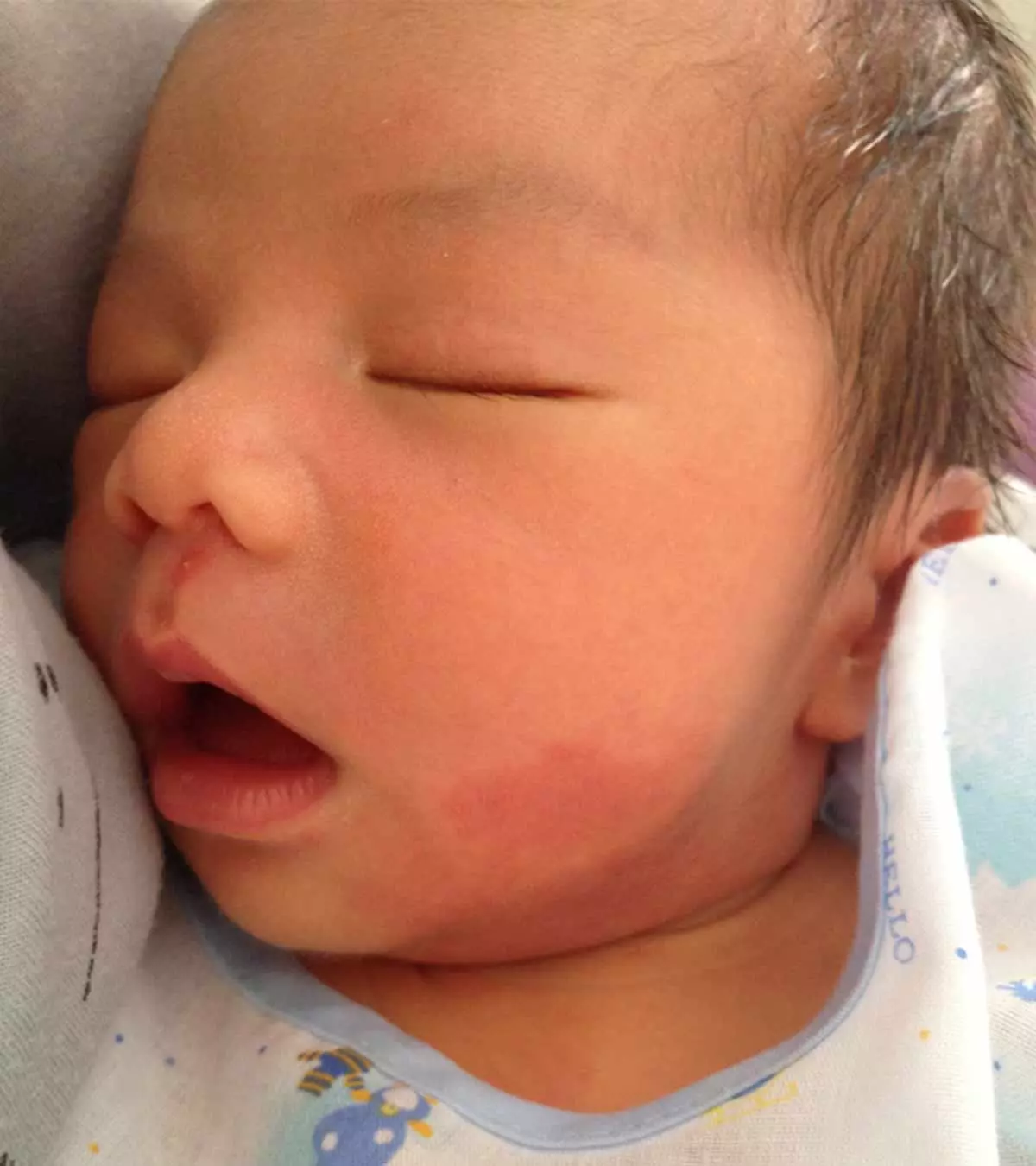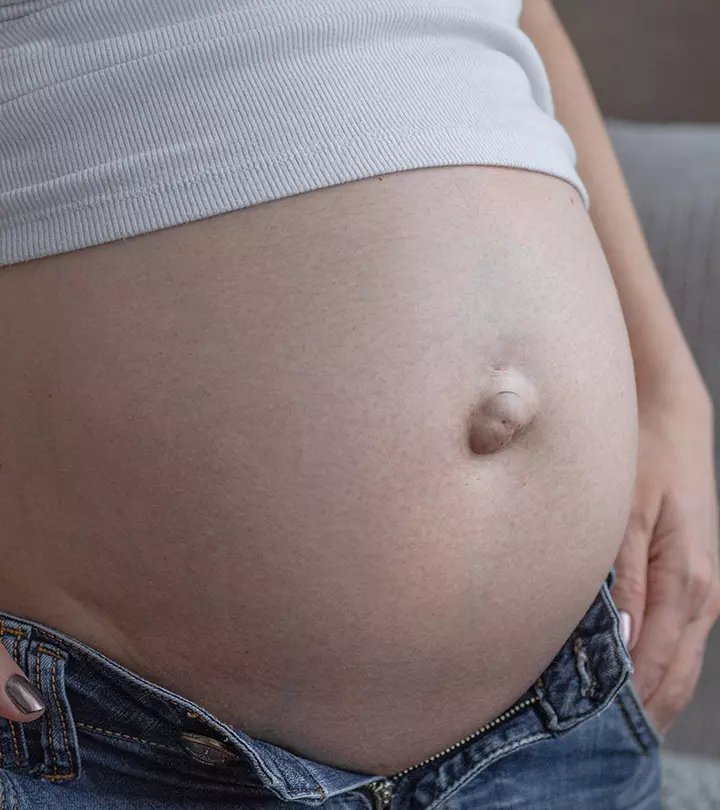
Image: iStock
The incidence of umbilical hernia in pregnancy is around 0.08% (1). It is a protrusion of an intestinal loop through a small opening in the abdomen around the umbilicus or belly button. The stretching of abdominal muscles in pregnancy could increase the risk of developing an umbilical hernia or belly button hernia. The condition could lead to complications in pregnancy if not treated on time. This post discusses the causes, risk factors, symptoms, treatment, and prevention measures for an umbilical hernia during pregnancy.

Key Pointers
- During pregnancy, you may develop either inguinal hernia, paraumbilical hernia, or umbilical hernia.
- Increased abdominal pressure and strained abdominal muscles might cause a hernia.
- Obesity before and during pregnancy also increase the risk of hernias.
- You may experience a dull pain or feel a lump on the belly button.
- In severe circumstances, umbilical hernia repair is addressed during a C-section birth.
What Are The Different Types Of Hernias During Pregnancy?
The following hernias may develop during pregnancy.
1. Inguinal hernia: An inguinaliRelated to the groin. hernia occurs in the groin region due to the protrusion of the intestine through the inguinal canal present in the lower abdominal wall (2). Inguinal hernia is often the most common cause of groin swelling among pregnant women (3).
2. Paraumbilical hernia: A paraumbilical hernia occurs in the tissues around the belly button. It often occurs due to the protrusion of an intestinal loop through a weak abdominal wall (4).
3. Umbilical hernia: Umbilical hernias occur at the belly button (umbilicus) and develop due to a weak spot in the abdominal muscles at the belly button (4). According to the European and American Hernia Societies, umbilical hernias in adults can be classified as small (< 1 cm), medium (between 1 and 4 cm), and large hernias (> 4 cm) (14).
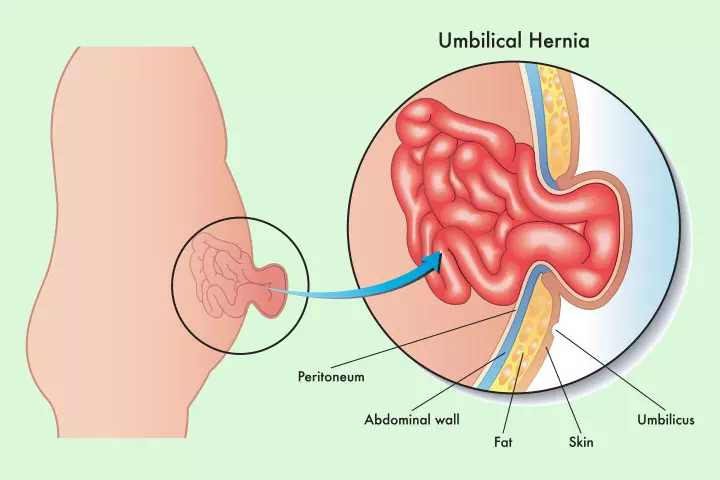
What Causes Umbilical Hernia In Pregnancy?
Umbilical hernia primarily occurs due to the protrusion of the intestine through a weak section of the abdominal wall. The following factors may increase the risk of this condition during pregnancy (5).
- Increased abdominal pressure: The growing uterus can increase intraabdominal pressure, especially as the pregnancy progresses. Some women may have innate weakness in the abdominal wall, such as due to an umbilical hernia during childhood or an incision around the umbilicus due to surgery. The increased abdominal pressure may increase the risk of umbilical hernia in such cases.

- Stretched abdominal muscles: The growing uterus causes the abdominal muscles to stretch. In some cases, the abdominal muscles may stretch far enough to stretch the rectus sheathiA fibrous compartment that contains the rectus abdominis and the pyramidalis muscle and forms the anterior wall of the abdomen. , a connective tissue covering the abdominal muscles. The rectus sheath fibers meet at the midline of the abdomen to form a band called the linea albaiA white, fibrous tissue that runs vertically on the middle of the abdomen in humans. . Pregnancy may stretch linea alba, causing an opening or a weak spot where the intestines may protrude out, causing an umbilical hernia (1). The separation of abdominal muscles is known as diastasis recti.
Stephanie, a mother expecting her third child, shares how she was diagnosed with an umbilical hernia during pregnancy. She explains, “My muscles separated during my first pregnancy… My pregnancy was awesome. However, I noticed my belly button popped out around four months of pregnancy. I thought that was odd, but I didn’t allow myself to worry. Later, I found out it was a hernia… The only issue I had was something was bulging out when I would do anything related to sit-ups. I thought my gut was coming out of me.
“I saw a few doctors, and they thought it might be a hernia. I was told then not to do anything about it unless it worsens… Just recently, I decided to see a general surgeon. He confirmed that I have Diastasis Recti. I spoke to the G.S. about what I was experiencing, and he didn’t think I could have a hernia near my diaphragm. I told him it bulges out when I give my abs a workout, cough, sneeze, laugh, etc. So he ordered a CT scan. The CT scan showed only an umbilical hernia (i).”
- Overweight or obesity: Women who are overweight or obese before pregnancy may be at a higher risk of hernia during pregnancy. Excess abdominal fat (abdominal obesity) may already stretch the linea albaiAlso known as 'white line' in Latin, it is a strong fibrous connective tissue of the anterior wall of the intestine. . Pregnancy may further add to this pressure, increasing the risk of umbilical hernia during pregnancy.
 Point to consider
Point to considerWho Is At Risk Of Umbilical Hernia During Pregnancy?
Studies show that women are three times more likely to get an umbilical hernia than men, mostly because of pregnancy and childbirth (14). Additionally, women with the following conditions may be at a higher risk of developing belly button hernia in pregnancy (6):
- Overweight or obese

- Preexisting umbilical hernia
- Multiple pregnancies (twins or triplets)
- Preexisting separation of abdominal muscles
- Presence of fluid in the abdomen (Ascites)
- Chronic coughing or sneezing ailment
- Frequent lifting of weights
What Are The Symptoms Of Umbilical Hernia In Pregnancy?
Some women may not experience any symptoms of umbilical hernia during pregnancy (7). This is because they are frequently asymptomatic, especially if the umbilical hernia is ≤1 cm. Therefore, in many cases, the diagnosis of the umbilical hernia is incidental during a routine pregnancy examination or for other reasons (14).
For instance, Sydney, a mother of two and blogger, shares her pregnancy update at 5 weeks. She says, “Week 5 I had an ovarian cyst rupture. This makes my abdomen swell up like a balloon because of the internal bleeding into the abdomen and the fluid from the cyst. It is basically like filling up a flat water-balloon to its full extent. Normally I have a flat stomach and there are lines where my abs are, nope, not in this picture. When I went to get my first ultrasound at 5 weeks they said there was tons of fluid on the sides under my ribs and obviously in my abdomen. When I have ovarian cysts rupture my belly button gets extremely bruised. The doctor thinks its from my umbilical hernia that I had when I was younger (ii).”
Others may experience the following symptoms.
- A lump is felt when you press the belly button or when you lie down.
- A visible bulge on the belly button.
- A dull pain around the belly button, especially evident when coughing, sneezing, laughing, bending, or moving.
In some cases, the protruded intestinal section may strangulate, affecting its blood supply or causing an obstruction (incarceration). It may lead to the following symptoms (5).
- Vomiting
- Fever
- Abdominal pain

- Discoloration of the lump (red/purple)
- Constipation
- Fullness and rounded abdomen
Does Umbilical Hernia In Pregnancy Affect The Baby?
Hernias in pregnancy, including umbilical hernia, usually do not affect the growing fetus in the womb (7). If your hernia is asymptomatic or causes only mild pain, it may not affect your pregnancy. However, incarcerationiIncarceration hernia is a complication of hernia that occurs when a part of the intestine gets trapped in the hernia, causing intestinal blockage. and strangulationiIt occurs when the blood supply of the trapped intestine in the hernia cuts off. of hernia may make the mother feel sick, which may affect the baby as well. Therefore, consult your doctor if you notice a hernia, even if asymptomatic, to determine its severity and avoid complications.
However, seek immediate medical care if you experience sudden and sharp abdominal pain, which is worsening, nausea and vomiting, or blood in stool (15).
How Is Umbilical Hernia In Pregnancy Treated?
Surgery is the only way to treat an umbilical hernia. The following treatment options are usually available for belly button hernia in pregnancy.
1. Surgery during pregnancy
Umbilical hernia repair surgery during pregnancy may only be considered if the hernia has become strangulated or incarcerated (7). In some cases, surgery might be delayed to the second trimester, if possible.
Surgical repair of hernia involves the placement of a mesh to reinforce the weak abdominal wall (8). The doctor will return the protruded intestine to its original place and stitch a mesh to the abdominal walls. Tissues will grow over the mesh, and the abdominal wall becomes stronger.
Mesh placement may interfere with the expansion of the uterus and the abdominal tissues as the pregnancy progresses. The doctor may use the alternative procedure of suturing or stitching the abdominal wall to make it stronger. However, this procedure may not strengthen the abdominal wall as mesh does. There might also be a risk of recurrence. Discuss with your doctor the best procedure based on your symptoms and stage of pregnancy.
2. Surgery during C-section
The C-section procedure could be used to repair the hernia, making it a combined procedure (1). The doctor will perform the mesh repair procedure when repairing umbilical hernia during C-section instead of sutures. This procedure is considered mostly safe for the mother and the baby and seldom takes any additional time than the standard C-section procedure. If your hernia requires repair, but you can wait till childbirth, you may elect for a C-section to have your hernia repaired as well.
If your hernia is asymptomatic, your doctor may suggest mesh repair after a few to several weeks postpartum, so that you have healed adequately after childbirth.
 Quick fact
Quick factCan You Have A Vaginal Delivery With Umbilical Hernia?
If your hernia is asymptomatic, you may proceed with a vaginal delivery as usual (9). Experienced and qualified obstetricians and midwives can handle the hernia effectively during delivery. Discuss with your doctor the precautions that you may need to take before the procedure.
How Is The Recovery After Treatment?
The post-operative care after umbilical hernia surgery could be similar to any surgery, including a C-section. The recovery care and time may vary based on the severity of your umbilical hernia and whether it was repaired during pregnancy, during C-section, or after childbirth.
The following are some salient points about the recovery process after belly button hernia surgery (10).
- You may be asked to drink eight to ten glasses of water a day and have high-fiber foods. This is to ensure smooth bowel movement and prevention of straining while using the toilet.
- You will have to refrain from strenuous activities for several weeks after surgery. You may have to avoid climbing stairs and lifting a weight of over 10lb (4.5kg) for the next six weeks.
- You may have to avoid lifting heavy weights for the next six months or more.
- Your doctor may recommend lactation-safe medication to manage any pain at the site of surgery.
- Sometimes, the doctor may prescribe a stool softener while taking the pain medication to prevent constipation (14).
- It is advised to avoid swimming and submerging in water for at least two weeks (14).
How To Prevent Umbilical Hernia In Pregnancy?
It may not always be possible to prevent umbilical hernia during pregnancy. However, taking the following precautions in the prenatal period might be helpful (11). These precautions can also help manage the condition if it occurs during pregnancy.
- Avoid lifting heavy weights during pregnancy to reduce the pressure on the abdominal area.
- Limit climbing stairs as you progress through your pregnancy.
- Try to maintain a healthy weight before and during pregnancy to minimize any strain. According to the CDC, if you had a normal pre-pregnancy weight (BMI between 18.5 and 24.9), you should gain 25-35 pounds during pregnancy (16).

- Drink adequate water and have a high-fiber diet to avoid constipation and straining while using the toilet.
- Do safe pregnancy exercises to keep your muscles healthy and strong.
- Provide adequate support to your belly when you lie down to avoid strain; you may try wearing a maternity support belt.
- Eat small and frequent meals to avoid bloating and, eventually, the pressure build-up around the abdominal area.
- Maintain a proper posture to reduce unwanted pressure on the hernia site.
- If you have an ailment that causes you to sneeze or cough often, seek treatment for it.
 Quick tip
Quick tipThe uncommon occurrence of umbilical hernia in pregnancy may be concerning and uncomfortable due to the visible bulging and pain around the belly button. However, rest assured that the condition is not generally known to raise complications for the mother or the baby unless the diagnosis or medical attention is delayed. Your doctor may check for the symptoms, and if you have an asymptomatic condition, you can safely carry it through the pregnancy until after the delivery. However, surgical intervention may be necessary if symptoms such as fever, constipation, and discoloration exist. Nevertheless, do not worry and trust your Ob/Gyn with the procedure. To put your mind at ease, discuss the safest options available during pregnancy.
Frequently Asked Questions
1. Can ultrasound detect umbilical hernia?
An ultrasound might detect the presence of a femoral hernia or any complications in the abdominal region that might have arisen due to the same.
2. Can an umbilical hernia rupture during pregnancy?
There have been studies that have shown the possibility of an umbilical hernia rupturing during the period of pregnancy (12).
3. What happens when an umbilical hernia in pregnancy is left untreated?
If left untreated, the umbilical hernia might have an increased chance of getting incarcerated and lead to cutting off the blood supply to the protruding intestine. The onset of severe conditions such as gangreneiDeath of tissue or organ due to impaired blood circulation or a bacterial infection. or peritonitisiAn inflammation or redness of the lining that covers the insides of the abdominal cavity and layers some abdominal organs. requires the surgical removal of the affected intestine (5).
4. Is compression good for umbilical hernia in pregnancy?
No studies have shown the benefits of using compression in the treatment of umbilical hernia during pregnancy. You should consult the healthcare provider and get the necessary treatment to avoid any unforeseen complications.
Is umbilical hernia surgery safe during pregnancy?
Umbilical hernia surgery can be safely performed during pregnancy if done by a skilled surgeon. If the hernia grows or causes issues, it is generally ideal to repair it in the second trimester, as risks to both mother and baby are lower in this stage (1).
Infographic: Umbilical Hernia Repair During Pregnancy
There is no fixed time of onset for umbilical hernia in pregnancy. It may occur anytime, and the severity may vary. Some women may require emergency surgeries to repair umbilical hernia to avoid complications. Check out the infographic to learn about umbilical hernia repair in pregnancy, helping you know why your doctor recommended immediate or delayed repair.
Some thing wrong with infographic shortcode. please verify shortcode syntax
Have you had a hernia before pregnancy, and worried about the complications continuing? Get the answers you need with this educational video.
Personal Experience: Sources
MomJunction articles include first-hand experiences to provide you with better insights through real-life narratives. Here are the sources of personal accounts referenced in this article.
i. Diastasis recti=mommy tummy of dooom! Everyone.
https://mygirlsmylifemyworld.blogspot.com/2012/07/diastasismommy-tummy-of-dooom.html
ii. Ruptured Cyst at 5 Weeks & 6-7 Week Pregnancy Update.
https://zdots.blogspot.com/2014/04/6-7-week-pregnancy-update.html
References
- Hakan Kulacoglu; (2008); Umbilical Hernia Repair and Pregnancy: Before during after.
https://www.ncbi.nlm.nih.gov/pmc/articles/PMC5796887/ - Inguinal Hernia.
https://www.niddk.nih.gov/health-information/digestive-diseases/inguinal-hernia - Do Kyung Lee et al.; (2011); Round ligament varicosities mimicking inguinal hernia in pregnancy.
https://pmc.ncbi.nlm.nih.gov/articles/PMC3204688/ - Umbilical or Paraumbilical Hernia Adults.
https://www.ruh.nhs.uk/patients/services/upper_gi/documents/Umbilical_or_Paraumbilical_Hernia_Adults.pdf - Umbilical Hernia.
https://www.hopkinsmedicine.org/health/conditions-and-diseases/hernias/umbilical-hernia - Umbilical hernia repair.
https://www.nhs.uk/conditions/umbilical-hernia-repair/ - Hernia During Pregnancy.
https://americanpregnancy.org/healthy-pregnancy/pregnancy-complications/hernia-during-pregnancy/ - Surgery for Hernia in Adults.
https://nyulangone.org/conditions/hernia/treatments/surgery-for-hernia - Hernias during pregnancy
https://www.hernia.org/types/hernias-during-pregnancy/ - Adult Umbilical Hernia Repair.
https://www.nhs.uk/conditions/umbilical-hernia-repair/recovery/ - Hernia.
https://my.clevelandclinic.org/health/diseases/15757-hernia - Adamu Ahmed et al.; (2011); Spontaneous Rupture of Umbilical Hernia in Pregnancy: A Case Report.
https://www.ncbi.nlm.nih.gov/pmc/articles/PMC3191721/ - Hernia During Pregnancy.
https://americanpregnancy.org/healthy-pregnancy/pregnancy-complications/hernia-during-pregnancy/ - Anouchka H. Coste et al; (2025); Umbilical Hernia.
https://www.ncbi.nlm.nih.gov/books/NBK459312/ - Umbilical Hernia.
https://my.clevelandclinic.org/health/diseases/umbilical-hernia - Weight Gain During Pregnancy.
https://www.cdc.gov/maternal-infant-health/pregnancy-weight/index.html
Community Experiences
Join the conversation and become a part of our nurturing community! Share your stories, experiences, and insights to connect with fellow parents.
Read full bio of Dr. Annal Vaidya
Read full bio of Shivali Karande
Read full bio of Rebecca Malachi
Read full bio of Reshmi Das








